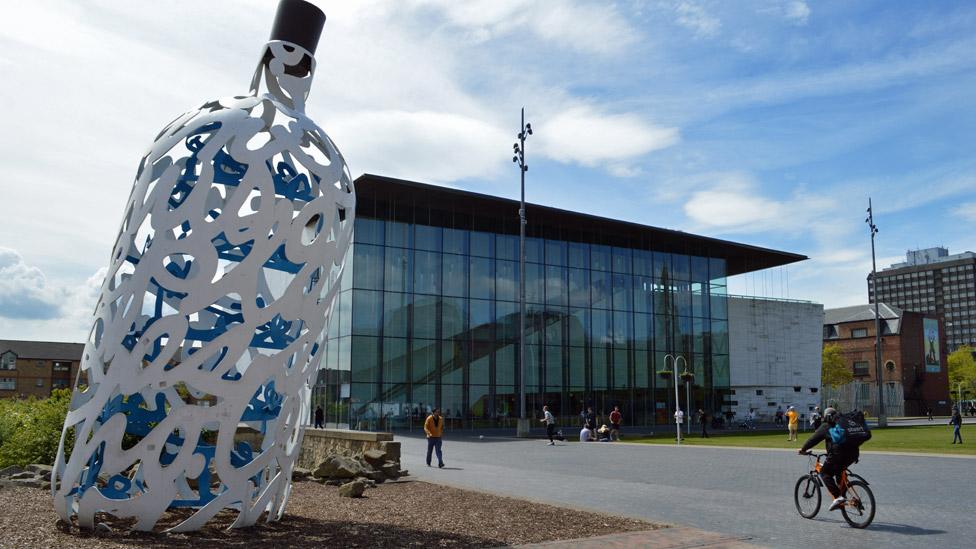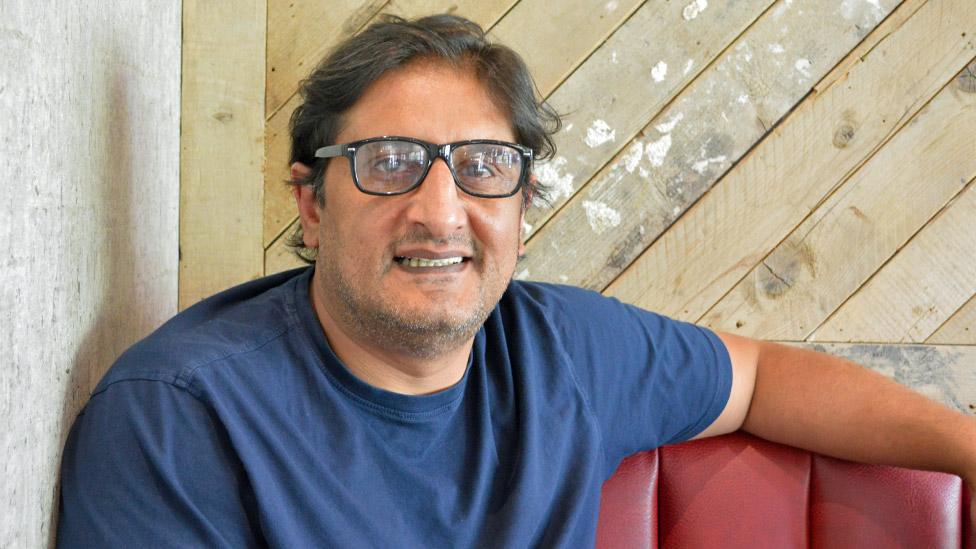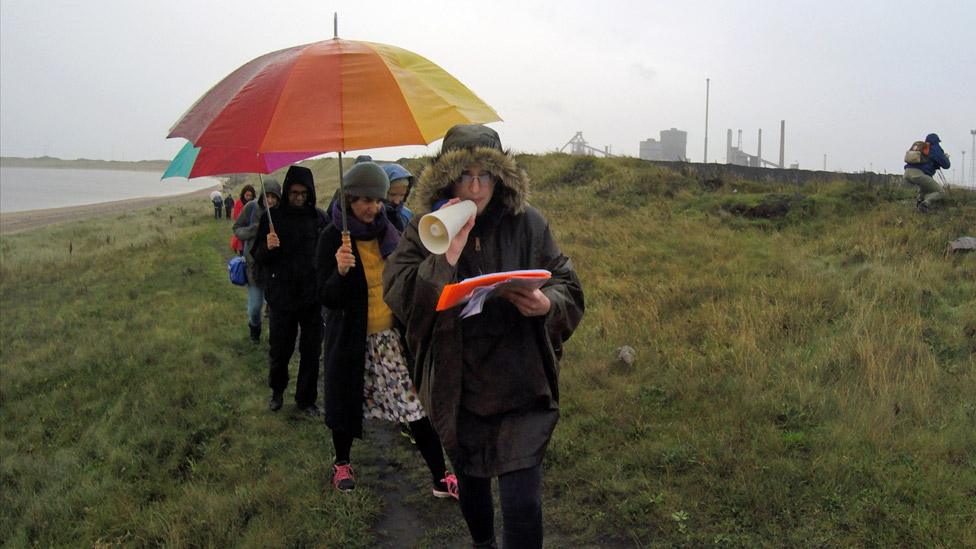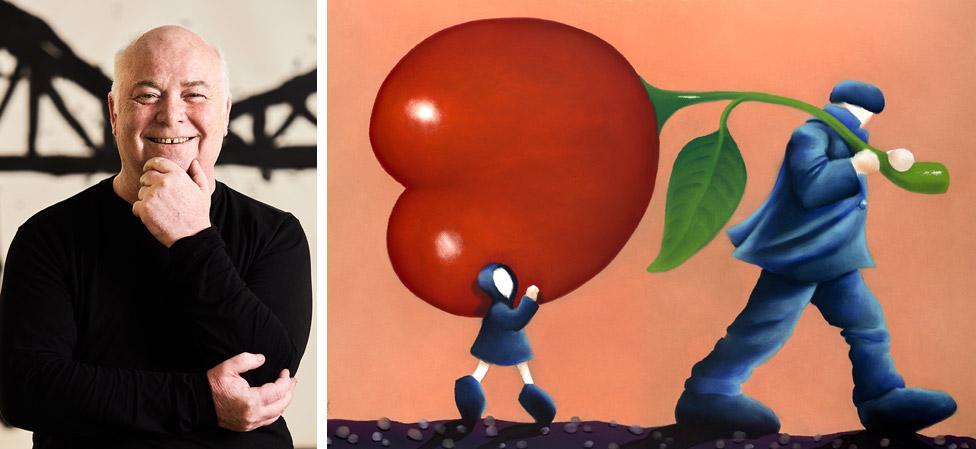We Are Middlesbrough: From a town of industry to a city of culture?
- Published

Mima - Middlesbrough Institute of Modern Art - has been open for 12 years
Once known for steelmaking and chemical factories, Middlesbrough wants to reinvent itself, and is looking to arts and culture to help.
On Thursday, it hosted the north-east of England's annual culture awards, run by two local papers; while it will be at the heart of the Tees Valley's bid to be UK City of Culture in 2025. And this weekend, some of the world's biggest pop stars will flock there for BBC Radio 1's Big Weekend.
Here, three artists from the town talk about why it deserves a better press, why being far from London provides artistic freedom, and why they are excavating its history and land - literally - for their creative projects.
Making Middlesbrough - the musical

One of acclaimed scriptwriter Ishy Din's next projects is a stage musical about the fortunes of his home town, beginning when Middlesbrough rapidly expanded during the industrial revolution.
"Sometimes we get a hard time," he says. "We're consistently at the top of lists. Bad lists. Worst place to live. Worst place to be a girl. Health. Employment. Education. And I think that's unfair."
His musical, Iron and Steel, will show a different view. He's creating it with actress and producer Victoria Gibson - daughter of Middlesbrough FC chairman Steve - as well as local folk group Cattle & Cane and singer-songwriter Alistair Griffin.
Having a creative career in Middlesbrough has its pros and cons, according to Din, who is also currently working on a play for the Royal Shakespeare Company and has written for Channel 4's Ackley Bridge.
Living costs are cheaper than London - to where many people move to try to make their names. But he thinks his career would have progressed faster in the capital.
"There aren't very many of us who have broken through, but in the town there are lots of people and lots of young artists striving to make the leap."
He credits the council with putting faith in culture to help turn the the town's fortunes around in the post-industrial age.
"We want to move forward. We want to celebrate the past but embrace the future. And culture is one of the things that will do it."

'We have freedom to think here'

Emily Hesse (front) leading a walking performance titled No Silence Here
Emily Hesse hasn't just taken inspiration from the Teesside landscape - she has taken the landscape for her art.
She excavated clay from the banks of the River Tees herself, and took a master's degree in ceramics to learn what to do with it.
She used it in projects including New Linthorpe, for which she set up a community kiln and gave 1,000 members of the public a lump of clay, and taught them basic techniques.
"It's a very ancient material," she says. "It embodies and holds within it the experiences of communities and traumas and tragedies as well as what it must have been to have lived here at various points in time."
For her parents' generation, art wasn't usually a career option in Middlesbrough. "Everybody was pretty much just sent into the steelworks, the industry, ICI."
Hesse didn't think art was a career option at first either, but when she was diagnosed with ovarian cancer at the age of 19, a consultant encouraged her to "go and have a life".
"I'm still here and I'm still having a life."
As well as a sculptor, she's an author, performer and activist. She published a book last year - her take on being an artist in the north-east, and being sidelined by more visible artists and institutions.
She's currently writing another book, making a film inspired by matriarchal communities, and organising a symposium for the 30th anniversary of a Middlesbrough exhibition titled Miners.
"Often I'm looking for moments to speak about a history that's been marginalised," Hesse says. "That's the root of my work - however those moments appear."
Middlesbrough's lower living costs allow her to do things she couldn't afford to in London, she says. Like have time to think. It also means she doesn't need to sell her art.
"If you're choosing to not produce a commodity, then you have to exist in a different way, and this is a great place to exist outside the capitalist structures of the art world," she says.
"We know we're making a sacrifice so we can have that time to think, so we can read a book, so we can produce work, so we can write books.
"We wouldn't get that anywhere else, and that's what this town can offer you."

Keeping the 'warmth' and 'comradeship' alive

Mackenzie Thorpe is one of Middlesbrough's most successful artistic exports - his colourful, affectionate paintings are owned by the Queen, JK Rowling and, apparently, Tom Hardy. He's currently on a world tour to mark his 30 years as an artist.
He doesn't live in Middlesbrough any more, but in April he returned to unveil a statue next to the famous Transporter Bridge - two children trying to spot their dad among the throng of men who would cross at the end of a shift.
It's a tribute to Thorpe's own father, and "a monument to the working man and the working woman", he says.
Telling the story of the statue, he explains: "All these men come roaring over, and it's, 'Have you seen my dad? Where's my dad? There he is! There he is!'
"And then he comes over and they grab hold of each hand and he turns round and says, 'Let's go home'. That warmth that goes through them is something that I really miss."
Middlesbrough still informs "every aspect" of his work, he says. It's work that is heavily tinged with nostalgia. If he's painting children with his trademark flowers and giant hearts, he's conjuring feelings from his own youth.
"In my mind, all I can see is these six-year-old kids running around the street with a busted ball. You think 'they've got nowt', but we had so much. We were totally happy. It's looking back in such an affectionate way and wishing I still had that."
He goes back regularly - but perhaps living elsewhere means it's easier to draw inspiration from memories of an era when the "comradeship" he often mentions was fostered by the heavy industry the town was built upon.
"It's because I constantly miss the place and miss what it means to me that keeps it fresh."

Follow us on Facebook, external, on Twitter @BBCNewsEnts, external, or on Instagram at bbcnewsents, external. If you have a story suggestion email entertainment.news@bbc.co.uk, external.
- Published15 January 2019
